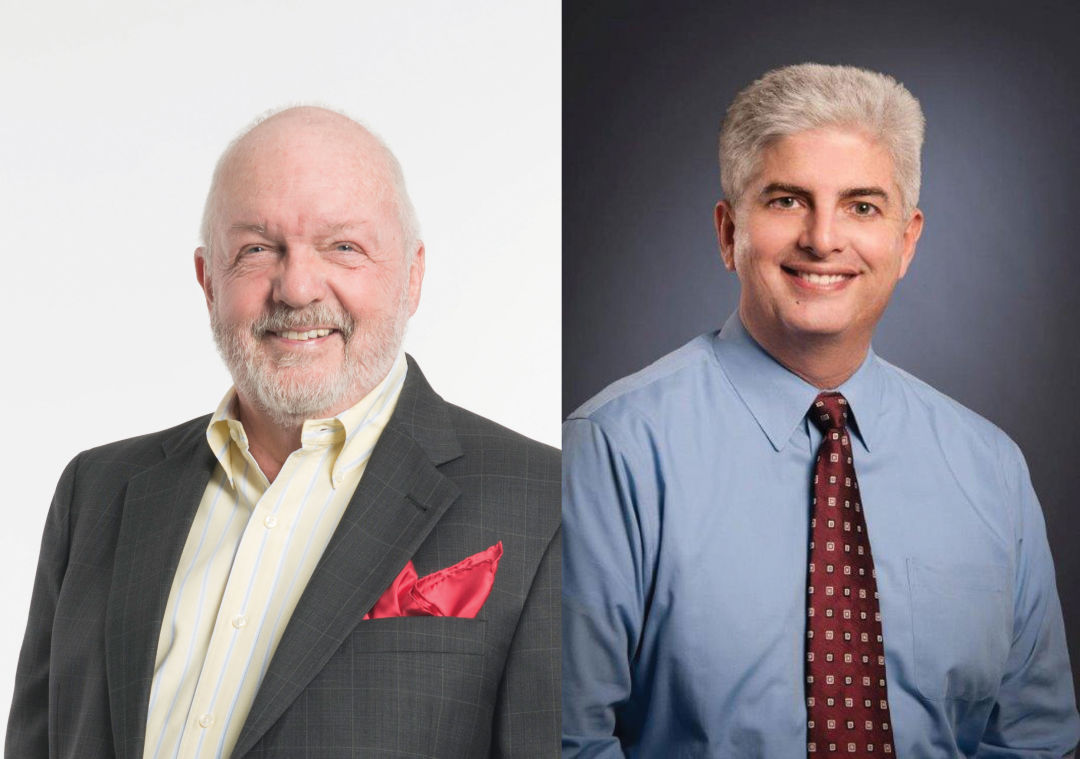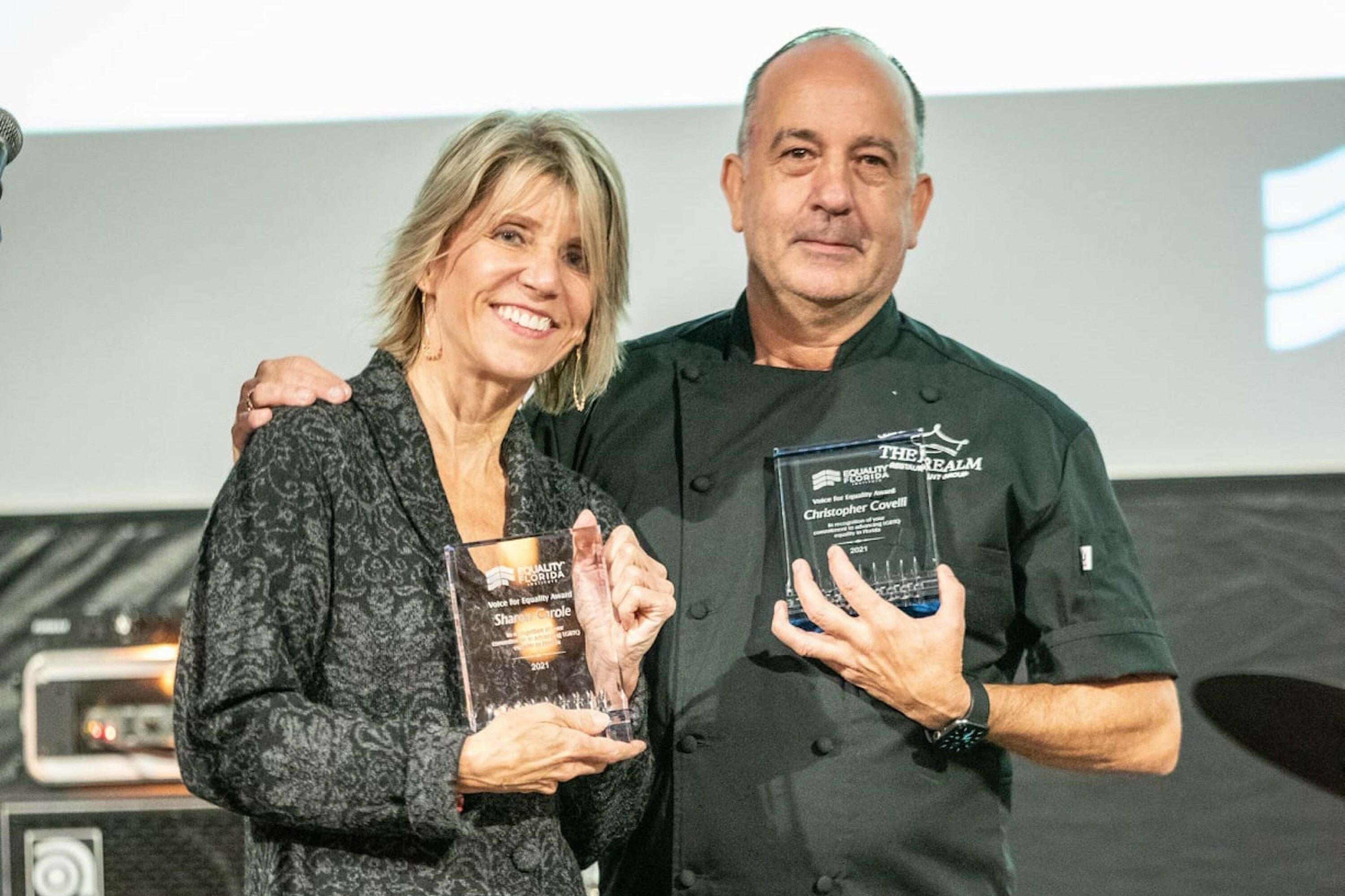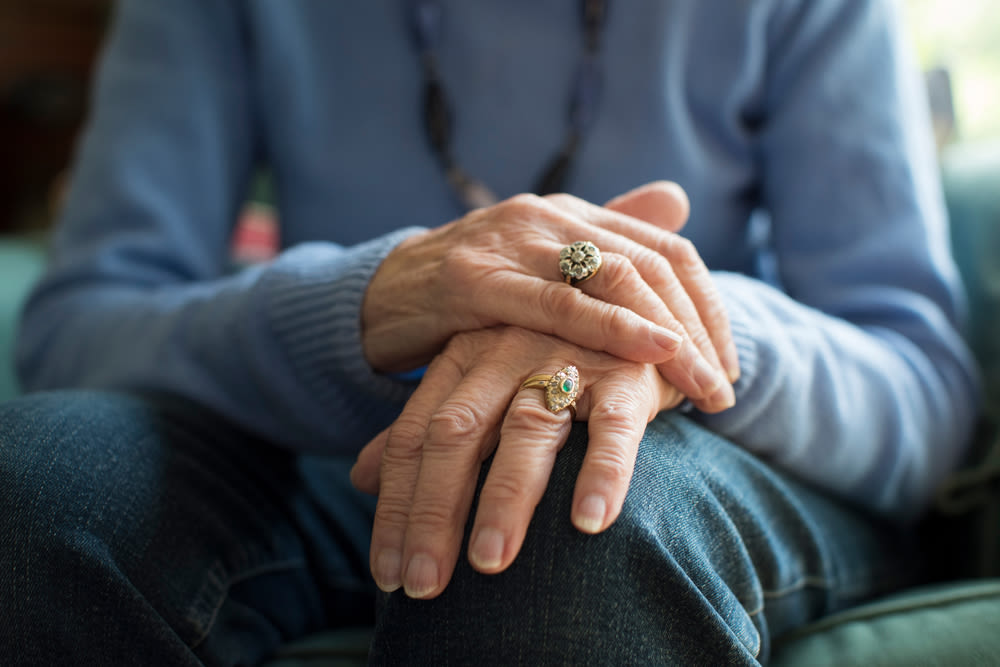Should Businesses Be Required to Provide Services to Same-Sex Couples?

In today’s contentious political climate, shouting and insults too often replace conversation, and actual listening is in short supply. Our new series, Civil Discourse, aims to bring civility and a willingness to seek common ground back to the discussion of divisive issues. We’ll invite officials and civic leaders with opposing views to sit down with editor Pam Daniel and do something radical: talk to each with courtesy, goodwill—and an open mind. We’re kicking the series off with a discussion between state Rep. Julio Gonzalez, R-Venice, whose proposed “Religious Freedom Bill” would allow many Floridians to refuse to provide services to those they object to on religious or moral grounds, and former Sarasota City Commissioner and current Florida ACLU president Ken Shelin, a longtime advocate for LGBT rights. (This is an edited version of the conversation; to read the complete transcript click here.)
Pam Daniel: We’re here to discuss the Religious Freedom Protection Bill that state Rep. Gonzalez has proposed—and that Mr. Shelin opposes. Despite this disagreement, you two have a lot in common. You’ve both enjoyed successful careers—Mr. Shelin with the Food and Drug Administration before he retired to Sarasota and Rep. Gonzalez as both a surgeon and a lawyer in Venice. You’re devoted family men, with spouses—Rep. Gonzalez has been married to the same woman for many years, and Mr. Shelin recently married his male partner—and children. You also both cared enough about your communities to take on the often thankless job of public service. And you’re both known for being outgoing and affable—you’re nice guys. So you seemed like a good pair to start our new Civil Discourse series, in which we hope people can discuss differing views with goodwill and civility—something so often in short supply in today’s political climate.
Rep. Gonzalez, your bill states that “Individuals, businesses with five or fewer owners, religious institutions, and businesses operated by religious institutions are not required to produce, create, or deliver a product or service to a customer if they have a religious or moral objection.” This would include health care providers and adoption agencies as well. Why is this bill needed?
Rep. Gonzalez: One of the guiding principles of our country is the protection of our religious freedoms. There are at least two cases in other states where people have been compelled or punished for not participating in activities that they felt were against their religious convictions.
Ken Shelin: The Declaration of Independence says that “All men are created equal.” It’s been a struggle since [then] to give meaning and substance to that word, “equal.” It took a civil war to get rid of slavery. Women could not vote until the earliest part of the 20th century. Now we’re faced with the LGBT community trying to give meaning to that word, “equality.”
[Your] bill allows people to be treated differently. That’s not fair. It’s probably also unconstitutional, which means that it is going to lead to lawsuits if it’s adopted. That would be unfair to taxpayers, because they’re going to pay the bill.
Gonzalez: Same-sex couples achieved [equality] last year when the Supreme Court ruled that all states were to recognize same-sex couples. Now the discussion is not about equality because equality, in terms of at least marriage, has been recognized. The question now is, “Can I force you to recognize my activity even though you believe it’s against your religion?” In the cases in New Mexico and Colorado, same-sex couples approached a baker and photographer to [ask] them [to] apply their artistic services [for] a wedding. They refused. They did not refuse because they were discriminating against same-sex couples, homosexuals, or anything of that nature. [They] refused to participate in a wedding of same-sex couples because it was against [their] religion. In both cases, the same-sex couples went to court and won.
Daniel: Mr. Shelin, can you identify with people wanting to practice their religion?
Shelin: They can’t practice their religion on me. The Constitution and the courts have traditionally protected people’s right to practice their religion. But if you’re providing a product or a service to the public, you can’t discriminate.
Gonzalez: In that situation, it is the state who is forcing the religious belief of the same-sex couple onto the individual who’s trying to not participate.
Shelin: We’re not talking about a religious ceremony. [Marriage is] a civil ceremony.
Gonzalez: Correct, but it is defined [as a religious ceremony] by the religious convictions [of the service provider]. That’s the important angle, I think.
Shelin: What if you have a Muslim who does not want to make a cake for a Christian ceremony?
Gonzalez: He or she should have the right to say no. So long as the number of individuals in the marketplace who are saying no is not sufficient—like only 1 or 2 percent of all stores—to incur a significant burden on the consumer, then there isn’t a compelling reason for the state to force a different view upon them. If that segment were 40, 50 or 60 percent, and it becomes burdensome for a same-sex couple to get their cake for their wedding, then the state would have to take a different position.
Gonzalez: [The bill] is definitely a work in progress. I’ve gotten so much feedback, and I’m reading [the way I wrote it] and going [about some of the criticisms], “Man, they’re right!”
Shelin: [The bill] is so broadly written. You’re not only talking about religious conviction, you’re talking about moral beliefs and policies, whatever they are.
Gonzalez: I agree. After listening to comments, I would remove the word “moral.” I would leave the word “religion.”
Daniel: If he were to modify the bill in a way that said it only applies to participation in religious activity, would you still object to it?
Shelin: I’d have to see another draft. But it is inherently discriminatory because it treats a group of people differently based on religious belief, and you cannot do that in the United States.
Gonzalez: I see the present situation as inherently oppressive.
Shelin: What’s oppressive? Nobody’s making you do anything.
Gonzalez: I’ve given you two state Supreme Court cases. In both cases, the courts told them, “You must act against your religious convictions.” Period.
Shelin: No, they’ve said, “You have to treat people the same no matter who they are.” That’s what the cases say. You’re changing the whole meaning of the decision.
Gonzalez: No, there have not been any situations like that.Daniel: Have any businesses or people in Florida been forced to provide services that violated their religious beliefs?
Shelin: By the way, 56 percent of Florida’s population is already covered by human rights ordinances that protect them from sexual orientation discrimination.
Daniel: Would your law override such ordinances?
Gonzalez: If a law said you couldn’t discriminate based on sexual orientation, but you were being asked to participate in an activity that is against your religion, you should have that protection. We can fashion a law that will protect both parties. Admittedly, it has to be narrowly focused because I don’t want the individual who is participating in a same-sex marriage to be unduly infringed. I want him to be able to get it from somebody else. But I don’t want the state to force an individual to give up his religious convictions only because he is opening up a business. That’s unacceptable.
Daniel: Would you also rewrite the part that allows adoption agencies not to place children with parents they object to on moral grounds?
Gonzalez: The only adoption agencies that should be protected are agencies that are religiously based.
Shelin: What if they take money from the state or the federal government?
Gonzalez: I don’t think they do.
Shelin: They do. In Florida it’s $1.2 billion.
Gonzalez: I don’t have a problem with adoption agencies accepting state or federal dollars and making decisions based on their faith. I think that’s great. It’s what makes our country fantastic.
Shelin: That’s tax money. Your money and my money. I don’t want Rep. Gonzalez using my money in order to discriminate against people.
Daniel: When other states passed similar bills, business threatened to boycott them. Would that happen here?
Gonzalez: I don’t know. I have been involved in a host of controversial bills already in my young involvement with the House of Representatives. I’ve never seen the amount of vitriol and hate mail that I have seen [about] this bill. All bets are off on what kind of kind of reaction there may be because I’ve been completely taken aback by the vitriol.
Daniel: Mr. Shelin, have you received any hate mail for your work [advocating for LGBT rights]?
Shelin: Oh, yeah. When I was on the City Commission I got hate mail, and I’ve saved it because I think I know who did it. They’ll get theirs eventually.
Gonzalez: I’ll tell you what I think. Something terrible happened in our country. Over the centuries, we started misusing religion [to discriminate] against segments of our society based merely on their race and their gender. I think the fact that this bill might potentially be used in this manner inspires so much vitriol.
Daniel: Does that possibility give you second thoughts?
Gonzalez: Absolutely. The problem is that the law is still going to be made. The law is going to be made by the courts because sooner or later something is going to filter up.
Daniel: You would prefer not to have the law made by the courts?
Gonzalez: I would prefer Ken and me to go to the House of Representatives and put some rules that respect both sides somehow, imperfect as it may be. Maybe we have to amend it later, but I would rather do that than to allow lawyers to make legal arguments and judges to make decisions purely based on their own…
Daniel: Couldn’t the Legislature have political agendas that the courts might not?
Gonzalez: I don’t think that’s true. If you look at the Supreme Court of Florida, virtually everything that’s not decided unanimously is either a 5:2 vote or a 2:5 vote. It’s always the same five, and it’s always the same two. To say the Legislature has a political agenda that the courts do not is not true.
Daniel: Society is changing rapidly, especially on issues of sexual orientation. Are you fighting against too big a tide, or would that not stop you, anyway?
Gonzalez: If you go into the Legislature and you decide you’re not going to tackle certain issues because they’re too big for you or you’re intimidated, you’re doing a disservice to your office and to the people who voted for you. To all the people. The Legislature is supposed to be a place where ideas clash.
Shelin: Are you going to withdraw this bill?
Gonzalez: I’m not going to withdraw the bill, but I am committed to working on it so that it is a better product.
Daniel: By the time we publish this, the session may be over and this could all be moot.
Gonzalez: Except that I’ll probably bring it back again next year.



